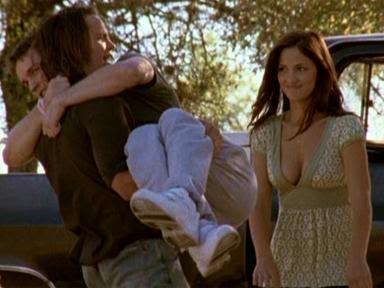 A new episode of Friday Night Lights airs tonight. There's a birthday gift if there ever was one.
A new episode of Friday Night Lights airs tonight. There's a birthday gift if there ever was one.It comes as the ciphers over at E! Online have unwittingly illustrated the dilemma of FNL fanatics are facing, the angst over the direction the show has taken in Season 2. No doubt the E! crowd had good intentions in trying to entice TV junkies to watch by comparing the show's main characters to those from more widely viewed shows -- mostly quote-unquote chick shows.
(For instance, the mom played by Connie Britton is supposedly like the mother from Gilmore Girls.)
Well, that's the problem. Obviously, people know the writers of television shows always borrow from what's come before, giving people something familiar while making it look brand-new. It goes without saying. Only a giant pedantic putz would even point out that for most TV junkies, Jim and Pam from The Office are to 2008 as Sam Malone and Diane Chambers were to 1986.
Friday Night Lights has kind have been an oasis for people who chafe at this convention. There just aren't enough of us in the world, it would seem, or too many of us are out on Friday nights and are unaccounted for in the Neilson ratings. Its characters, its storylines, really derive more from the conventions of a novel than from a TV drama, not some meeting of the network suits. Maybe the latter is just as true of Friday Night Lights, but so what? It doesn't feel that way, so it doesn't matter.
Now, can you imagine a book reviewer at any point in modern times trying to entice people to read an unjustly neglected writer by comparing her or his characters to those from other authors? Of course not.
The one character who kind of epitomizes what Friday Night Lights is all about is Buddy Garrity (Brad Garrett), a football booster and father of Lyla, Minka Kelly's character. Tellingly, the E! Online crowd didn't bother with a comparison for Buddy, since a middle-aged car dealer doesn't hold a lot of appeal for Grey's Anatomy fans.
Buddy is the best character in show by far, at least to someone who grew up with the hold sports has on people in small towns. When Buddy is on the screen -- and he's often very tightly framed, as if to convey Buddy's belief that he must be treated like a big man - it brings to mind that local businessman. You know him: He owns something like a car dealership or a restaurant in town, but needs to find his self-worth by becoming a big backer of local sports teams, be it a junior hockey club in Canada or a high school football team in Texas.
It's all showing, no telling. You get that he's a good man ruled by vanity. He's getting what he has coming to him by having his family fall apart and having the team's new coach freeze him out, yet you end up rooting for him.
That's one kind of the sensitivity that makes Friday Night Lights tick. That is apparently lost -- or should that be Lost? -- on a lot of people. Point being, the show is going to rise or fail on its whole, not by ripping off pieces from The O.C. or Grey's Anatomy. However, if that's what it takes to grab more of the key demos, so be it.
Related:
If You Like Good TV, You'll Love Friday Night Lights (E! Online, via The Big Lead)
(UPDATE: There's a review at TV Squad ... good episode in general.)
That's all for now. Send your thoughts to neatesager@yahoo.ca.






1 comment:
Oh I love this, and I fully agree. Most of the popular media tries to quantify Friday Night Lights in terms that people can understand. First, it was "It's about football!" When that didn't work, "It's not JUST about football! We have hot young things making out all over the place!" And when that didn't work, "It's a show about COMMUNITY, about FAMILY."
But none of that works. Because Friday Night Lights isn't a show about something, it's a show about everything. Every small town dream and frustration you ever had. You can't compare that kind of complex writing and storytelling to The OC or Gilmore Girls, or anything else on TV. It does a giant disservice to the show to try to hook people by telling them to expect the expected, when it's in the unexpected that Friday Night Lights thrives so.
Post a Comment